Introduction
Are you like me? Do you love the idea of opening up a pool in your backyard but worry that it isn’t safe for kids, especially toddlers? If so, then I’ve definitely got some good news for you. It turns out, above ground pools and their associated chemicals aren’t as scary as they’re reputed to be. In this blog post, we’ll cover everything there is to know about whether or not they are safe for babies and how you can keep them safe while enjoying a little fun in the sun.
Are above ground pool chemicals bad for my baby?
Many parents wonder if the chlorine in their pool is safe for their baby. Chlorine is a strong chemical that can irritate the skin, especially if it is exposed to it for long periods of time. However, your baby’s skin will be more sensitive than yours due to its size and lack of protective oils. If you have any doubts about whether or not your baby can handle swimming in chlorinated water, check with your pediatrician before letting them swim.
Also be sure to keep an eye on how much time they spend splashing around—babies aren’t known for having great judgement skills when it comes to knowing how much is too much!
Chlorine may also cause irritation or dryness of the eyes and throat if inhaled directly or swallowed accidentally when swimming in a pool containing chlorine (this isn’t likely with above ground pools since there’s no way for small children to accidentally ingest anything).
The first thing to consider is how you intend to keep the chemicals away from your baby.
The first thing to consider is how you intend to keep the chemicals away from your baby.
The second thing to consider is if it’s possible for a child or pet to ingest or inhale the chemicals.
If you can’t avoid these things, it’s best not to use any pool chemicals in your above ground pool at all.
That said it is almost impossible to keep your pool freshly blue without help…so…
Most experts recommend using at least two or three chemicals to keep your pool clean.
Most experts recommend using at least two or three chemicals to keep your pool clean. The most common chemical used to clean pools is chlorine, which should be added in small amounts on a regular basis.
The amount of chlorine used depends on the size of your pool and how often it’s used. Chlorine levels should remain around 1ppm to 3ppm most of the time; however, they can rise as high as 5ppm during peak usage times such as weekends and holidays.
When adding chlorine, make sure you use a test kit so that you don’t add too much or too little!
Chlorine levels should remain around 1ppm to 3ppm most of the time, with a little extra during times of high use.
The chlorine level in your pool should be between 1ppm and 3ppm most of the time, with a little extra during times of high use. During low use periods (such as over the winter), it can drop as low as 0.5 ppm or even lower (though this is not recommended). Chlorine levels can easily be tested using a test kit that is available at your local hardware store or online.
For the best chlorine prices delivered to your door, just click here…
It’s also important that the level doesn’t drop too low — if you have a high chemical usage day and find that it’s dropped below 1ppm, be sure to add more chlorine ASAP.
- How to add chlorine: Chlorine is added to the pool in a chemical called calcium hypochlorite, which breaks down into chlorine gas. To keep your baby safe and your water clean, be sure that you’re using only an above-ground pool cleaner with a floating dispenser like the Poolmaster Floating Chlorine Dispenser or In-Line Filterless Chlorinator.
- How to test your pool’s chlorine level: You can test if there’s enough free available chlorine in the water by using either a liquid test kit (recommended) or a paper strip test kit. Then it’s just basic math! If you’re using a liquid testing kit, remember that 1 milliliter = 1 part per million (ppm). If you’re using paper strip tests (which are not as accurate), then each square equals about 0.5 ppm of free available chlorine (so 10 squares = 5 ppm).
- How to prevent levels from dropping too low: Keeping levels at 1 ppm will help keep bacteria out of your pool while keeping it safe for swimming and maintaining healthy skin rashes free skin for kids!
How to protect my baby’s skin from chlorine pool water
If you choose to take your family to a swimming pool, there are some precautions you can take to protect your children’s skin from the harsh effects of chlorine. Here are some tips for making sure that their skin doesn’t become irritated in the water:
- Use a baby sunscreen. Make sure to apply it before entering the pool and reapply it every two hours. This will help protect their sensitive skin from UV rays, which can cause sunburns, wrinkles and even cancer at an early age.
- Wear a bathing suit specifically designed for babies instead of regular clothing like shirts or pants (this will also help prevent any potentially embarrassing accidents). If possible, opt for one with SPF protection built in so that your child doesn’t need extra sunscreen on top of what they already have; this is especially important if they have sensitive skin or light hair since these types tend not be protected as well by traditional sunscreens unless applied liberally enough that they look like slathering yourself with Crisco oil! Also remember: no hats or sunglasses are allowed inside these areas because they could hurt someone else who falls into them while playing around.”
Chemical Alternatives that won’t irritate a baby’s skin
There are some other chemicals that can effectively clean your pool but aren’t as likely to irritate a baby’s skin as much as liquid chlorine might.
There are some other chemicals that can effectively clean your pool but aren’t as likely to irritate a baby’s skin as much as liquid chlorine might. Diatomaceous earth, bromine, biguanide and hydrogen peroxide are all safe for use around babies because they don’t contain any of the harsh ingredients found in liquid chlorine.
Other chemicals you can use include: phosphate, ozone, salt or salt water (used with a floater), sodium hypochlorite (pool shock), pool shock tablets and granules. If you ever considered transforming your above ground pool into a saltwater system then read our article about it here – this is super DIY!
Be sure to follow the dosage instructions on these products; if you use too much of one chemical or another, it could irritate your baby’s eyes or skin.
Diatomaceous earth is one of the best alternatives for above ground pools, and is often used by commercial swimming pool owners because it does such a good job of cleaning the water.
Diatomaceous earth is a natural pool cleaner that is made from the fossilized remains of diatoms, a type of algae. It can be used in both above ground and in-ground pools, and can be used with or without chlorine.
Diatomaceous earth is safe for everyone to use, including babies. It is also environmentally friendly since it does not contain any chemicals or harmful additives that might harm your family or pets.
Other types of chemicals that may be safe for babies include bromine, biguanide, and hydrogen peroxide.
In addition to chlorine, there are other types of chemicals that may be safe for babies. Bromine, biguanide and hydrogen peroxide are all popular alternatives and can be used in place of chlorine.
Some people prefer bromine because it is often considered safer than chlorine for babies and people with sensitive skin. It’s also a good alternative for those who are allergic to chlorine.
Good above ground pool maintenance will prevent your baby or anyone who uses your pool from having an allergic reaction to the chemicals in it.
Good above ground pool maintenance will prevent your baby or anyone who uses your pool from having an allergic reaction to the chemicals in it.
- Keep the water clean:
- You can’t control what goes into your pool, but you can keep it clean by scooping out leaves and debris regularly. This will help prevent algae growth which is common in above ground pools.
- Use chlorine tabs for water purification and shock treatment when needed (follow directions on package).
Conclusion
This is a very important question that you need to ask yourself before you get your pool treated. Chlorine is one of the chemicals used in sanitizing an above ground pool but it has long been known that the substance causes skin irritations and allergies.
You should also consider other factors such as the amount of time you spend outside or whether there are any other people who may come into contact with these chemicals.
Related Questions
How to protect my baby’s skin while swimming?
Keep your child’s skin protected from chemicals by:
- Using a pool cover.
- Washing your child’s hands after swimming.
- Using non-chlorine based soap or shampoo to wash their hair. As well as a non-chlorine based sunscreen if they will be outside for extended periods of time (the sun can penetrate through the water).
Does Chlorine affect a baby’s skin?
Chlorine can cause irritation, dryness, redness and flaking. If your baby’s skin becomes red or irritated after swimming in the pool you should discontinue use of the chlorine until his/her skin is no longer irritated.
If you swim for a long period of time it may cause peeling or cracking of the skin on exposed areas such as fingers and toes. This is due to over-exposure to chlorine and not from bathing in chlorinated water itself.
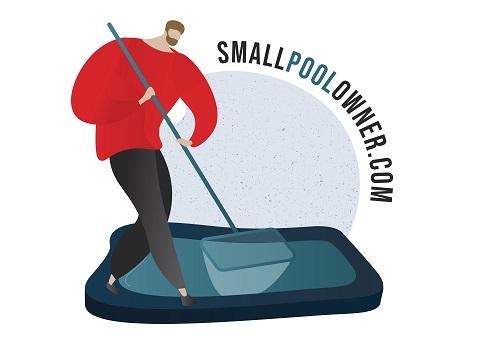
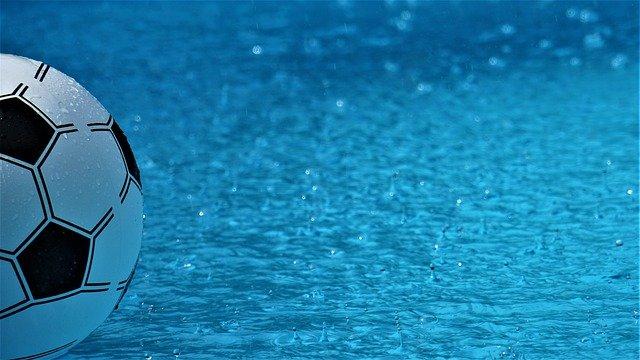


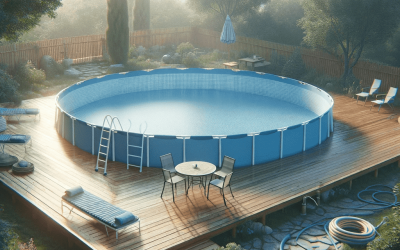
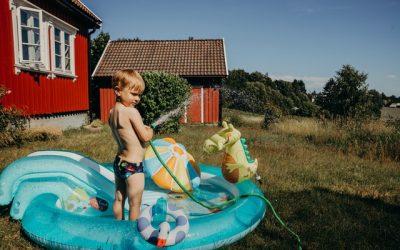
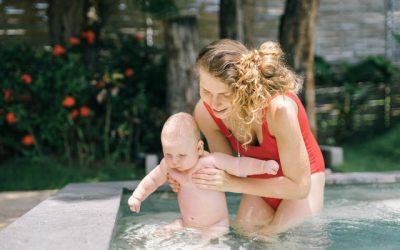
0 Comments